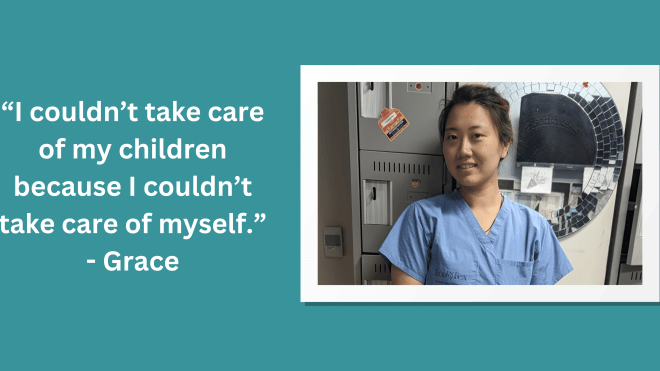
It is heartbreaking to monitor social media when a patient from Ontario Shores goes missing and the Durham Regional Police Service (DRPS) post a media release in an effort to inform the public and safely return the individual to hospital.
I understand why the public must be alerted and the responsibility DRPS has to both transparency and community safety.
However, when a patient does go missing and news enters the social media community, I am profoundly frustrated and disappointed by the reaction of many.
As a member of the Ontario Shores family and someone who firmly believes in the difference this hospital makes in the lives of people living with mental illness, I am, without question, biased. I understand the hopelessness people struggling with mental health issues feel before they reach out for help or begin receiving care. I also understand that recovery from mental illness is extremely complex and requires a lifelong commitment to managing one’s mental health. Even with such a commitment, there will always be many ups and downs.
That’s important to understand when you see on social media that a patient has gone missing from Ontario Shores.
The moment someone becomes an inpatient at Ontario Shores it is our job, as a specialty mental health hospital, to not only treat the person’s complex mental illness, but to provide them with the tools to manage their health and, ultimately, successfully transition back into the community. Inpatients at Ontario Shores have complex needs and typically have unsuccessfully navigated the complicated mental health system prior to being admitted. Many have seen their doctors, been to clinics and made trips to emergency rooms before coming to Ontario Shores.
For some inpatients, they were admitted to Ontario Shores following a Not Criminally Responsible (NCR) verdict. An NCR verdict is rendered if a person has committed an illegal act but, at the time, was suffering from a serious mental illness that prevented him or her from appreciating the nature or quality of the act or knowing that is was wrong. Once a person is found NCR, they leave the criminal justice system and enter the forensic mental health system, under the authority of the Ontario Review Board (ORB). From that point on, our job as a specialty mental health hospital is to treat their illness, provide them with the skills they need to effectively manage their mental health going forward, and to assist them in successfully transitioning back into the community when they are ready.
On the forensic side, the length of stay is typically measured in years. Once found NCR, patients must demonstrate consistently over a long period of time that they are full participants in their recovery and have a strong understanding of how to manage their mental health in order to access privileges, day/weekend passes, community living or discharge.
So, back to why patients go missing.
Simply put, they are humans dealing with a diagnosis that is complicated and life long. Managing a complicated mental illness requires extensive focus and understanding. It also comes with a great deal of frustration and isolation.
The stigma associated with mental illness and with staying long-term at a mental health hospital is real. Despite the support from our incredible staff, inpatients are often alone with the weight of living with a mental illness, something they certainly did not ask for.
Currently, we are living amid a pandemic where cases of COVID-19 are on the rise. Officials are attributing the increase to COVID-19 Fatigue, meaning people are tired of the restrictions we have been living with since March. The frustration of losing our ability to visit friends and family or participate in activities we once enjoyed, has led some people to ignore the pandemic and take risks by gathering for social events.
While I am not condoning this behaviour, it is understandable. Collectively we are tired of the pandemic and want our lives back.
Now imagine, being an inpatient in a hospital away from the people you love and relationships you once enjoyed for a number of years. Imagine having a down day or a down week. Our patients are as human as you are. They have good days and bad days. Sometimes they make good decisions and sometimes they don’t. Sometimes they give in to a moment of weakness, just like I do, or you do.
Having access to the community on privileges or medical appointments is part of preparing patients to be discharged into the community. Failure to successfully use these privileges is also part of the process.
Often, a patient is only missing for a brief time. Many times, they contact the hospital or police on their own volition asking to be picked up after a few days.
When a recovering alcoholic or substance abuser relapses, we often show empathy and wish them success as they re-enter treatment and begin to rebuild their life.
Our patients deserve that same treatment.
Some, because of the nature of their illnesses have been in contact with law and been a party to violence. That is true. However, that was at a time when they were likely living undiagnosed, untreated and without any understanding of how manage their mental health.
Unfortunately, when the law and violence collide, a person often gets branded for life. Regardless of how many hours of treatment received or skills learned, in the eyes of many a patient who goes missing will always be a ‘crazy’ or ‘violent’ person that Ontario Shores couldn’t keep track of.
I encourage you to remember Ontario Shores is not a prison. We are a hospital which provides treatment and develops skills our patients need to be successful in the community. Sometimes relapse is part of the journey.
I also encourage you to remember there is a human behind every headline you see on social media involving Ontario Shores. They deserve empathy, compassion and to be treated with dignity.



